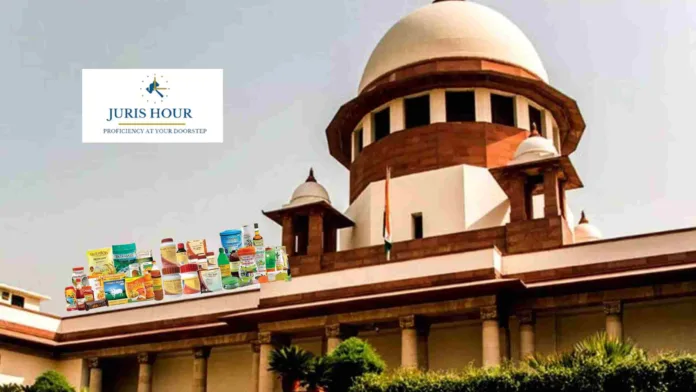The Supreme Court ruled that Section 27 of the Customs Act is not applicable when the refund sought is wrongly invoked by bank.
The Division bench of Justice Abhay S. Oka And Justice Ujjal Bhuyan observed that Section 27 of the Customs Act and Section 11B of the Central Excise Act deal with the question of refund. Refund can be denied either in part or wholly by applying the doctrine of unjust enrichment. Before we examine the above concept, it would be apposite to refer to Section 27 of the Customs Act.
The appellant had furnished bank guarantee for the differential amount through its banker in favour of the department.
Upon furnishing the bank guarantees by the appellant, the subject goods were allowed to be cleared by paying customs duty payable under Section 14(1) of the Customs Act. In the meanwhile, M/s M.P. Glychem Industries Limited stood merged with M/s Ruchi Soya Industries Limited in terms of the order of the Bombay High Court and thereafter came to be known as M/s. Ruchi Soya Industries Limited.
Special Civil Application were finally decided by the High Court vide the judgment and order. All the three writ petitions were dismissed. Consequently, the interim relief granted earlier stood vacated.
Against the aforesaid judgment and order appellant approached the Court in Civil Appeal. While the civil appeals were pending before the department encashed the bank guarantees and appropriated the sums covered by the bank guarantees.
Appellant filed three refund applications before the department seeking refund of the differential duty amounts but the department ignored the contentions of the appellant. The Appellant aggrieved by the actions of the Department had filed the writ petitions before the High Court and the High Court by the common judgment and order, dismissed all the three writ petitions.
The Supreme Court said that any person claiming refund of any duty may make an application for refund of such duty and interest, if any, paid on such duty to the Assistant Commissioner of Customs or Deputy Commissioner of Customs if he had paid the duty in pursuance of an order of assessment or borne by him.
Such application besides being required to be filed within the stipulated period should also be accompanied by such documentary and other evidence to establish that the amount of duty and interest which is claimed by way of refund was collected from or paid by him and that the incidence of such duty and interest had not been passed on by him to any other person.
The bench noted that respondents had recovered the differential duty amount by adopting coercive method i.e. encashment of the bank guarantees which were offered as security for the differential amount of duty on orders of the High Court.
The court further noted that under the scheme of the Customs Act, duty is assessed provisionally or finally whereafter an assessment order or orderin-original is passed. Post assessment order or order-in-original, the concerned importer is required to pay the assessed duty. If the importer does not pay the duty, revenue can enforce recovery under Section 142 of the Customs Act as recovery of sums due to the Government.
“The key word in Section 27 of the Customs Act is ‘paid’. Refund thereunder is permissible only if any duty is ‘paid’ by the claimant which subsequently becomes refundable either fully or in part. In the facts of the present case encashment of bank guarantees offered as security cannot be treated as payment of customs duty”, the court observed.
The bench stated that the Respondents could have either awaited the decision of the Court or could have directed the appellant to renew the bank guarantees. This they did not do. Instead they resorted to arbitrary encashment of the bank guarantees. Such encashment of bank guarantees cannot be treated as payment of duty or duty paid by a claimant. In such circumstances, the doctrine of unjust enrichment or Section 27 of the Customs Act would not be applicable.
The court further stated that respondents are holding on to money of the appellant which they are not authorized to do so as per judgment of this Court in Param Industries Limited. They have no authority in law to hold on to such money and, therefore, the same has become totally untenable.
The court set aside the judgment and order of the High Court and directed the respondents to immediately refund the amounts covered by the bank guarantees to the appellant with interest.
Case Details
Case Title: M/S PATANJALI FOODS LIMITED v/s UNION OF INDIA & ORS.
Citation: CIVIL APPEAL NOS. 3833-3835 OF 2025
Read More: Central Vigilance Commission Issues Master Circular on Definition of Vigilance Angle

